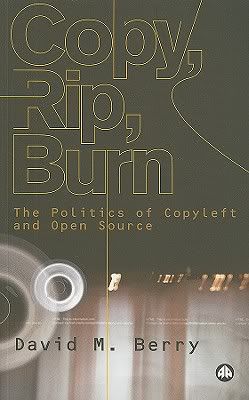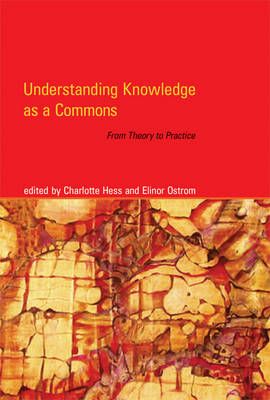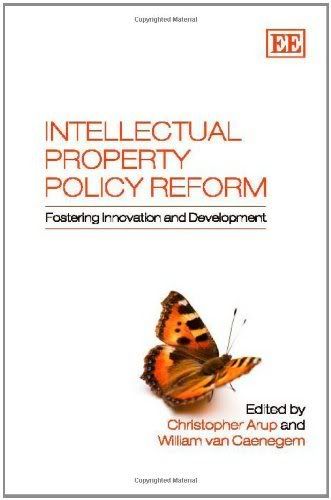Неочакваните като масовост и всеобхватност - имам предвид безотносителност къмто политически пристрастия, протести срещу ACTA зададоха един много сериозен въпрос пред днешното българско общество. Нямам предвид въпрос пред политиците (не визирам само ГЕРБ, а всички управлявали досега и жаждащи тепърва да управляват). Въпросът е поставен пред хората, които ще определят бъдещето ни като модерна нация. Това са не само учениците и младежите, не само младите градски професионалисти (юпита, по съвременния жаргон), Сред тях са дори пенсионерите, които бяха на протестите. Това са хората, които днес споделят дигиталното ни Интернет бъдеще. Но мисля, че носителите на бъдещето все още го усещат и възприемат повече с интуицията и чувствата си и сравнително по-малко имат необходимата информационна база да го осмислят. На тях предлагам за свободен даунлоуд следващите книги (съпроводени са резюметата на Amazon):

Pluto Press (September 20, 2008) | English | ISBN-10: 0745324142 | ISBN-13: 978-0745324142
From downloading music and movies to accessing free software, digital media is forcing us to rethink the very idea of intellectual property. While big companies complain about lost profits, the individual has never enjoyed such freedom and autonomy. Berry explores this debate in a concise way, offering an ideal introduction for anyone not versed in the legalistic terminology that -- up until now -- has dominated coverage of this issue.Looking at the historical development of the free software and the open source movement he examines its growth, politics and potential impact, showing how the ideas that inspired the movement have now begun to influence the wider cultural landscape. He explores whether free software offers us the potential to re-think our relationship with technology in the information society. This book will appeal to students of media and journalism, and anyone interested in new opportunities for creating a truly independent and democratic media.
Download:

The MIT Press; 1 edition (December 1, 2006) | English | ISBN-10: 0262083574 | ISBN-13: 978-0262083577
Knowledge in digital form offers unprecedented access to information through the Internet but at the same time is subject to ever-greater restrictions through intellectual property legislation, overpatenting, licensing, overpricing, and lack of preservation. Looking at knowledge as a commons--as a shared resource--allows us to understand both its limitless possibilities and what threatens it. In Understanding Knowledge as a Commons, experts from a range of disciplines discuss the knowledge commons in the digital era--how to conceptualize it, protect it, and build it.Contributors consider the concept of the commons historically and offer an analytical framework for understanding knowledge as a shared social-ecological system. They look at ways to guard against enclosure of the knowledge commons, considering, among other topics, the role of research libraries, the advantages of making scholarly material available outside the academy, and the problem of disappearing Web pages. They discuss the role of intellectual property in a new knowledge commons, the open access movement (including possible funding models for scholarly publications), the development of associational commons, the application of a free/open source framework to scientific knowledge, and the effect on scholarly communication of collaborative communities within academia, and offer a case study of EconPort, an open access, open source digital library for students and researchers in microeconomics. The essays clarify critical issues that arise within these new types of commons--and offer guideposts
Download:

Edward Elgar Pub (September 2009) | English | ISBN-10: 1848441630 | ISBN-13: 978-1848441637
This state-of-the-art study argues that reforms to intellectual property (IP) should be based on the ways IP is interacting with new technologies, business models, work patterns and social mores. It identifies emerging IP reform proposals and experiments, indicating first how more rigor and independence can be built into the grant of IP rights so that genuine innovations are recognized. The original contributions illustrate how IP rights can be utilised, through open source licensing systems and private transfers, to disseminate knowledge. It also recommends reforms. The discussion takes in patents, copyright, trade secrets and relational obligations, considering the design of legislative directives, default principles, administrative practices, contractual terms and license specifications. Providing contemporary empirical studies and covering public administration, collective and open approaches, and regulation of private transactions, this comprehensive book will prove a stimulating read for academics and students of law, business and management and development studies. Government policy makers and regulators as well as IP managers and advocates will also find much to provoke thought.
Download:

Free Press; 1 edition (January 8, 2008) | English | ISBN-10: 1416532188 | ISBN-13: 978-1416532187
Download: